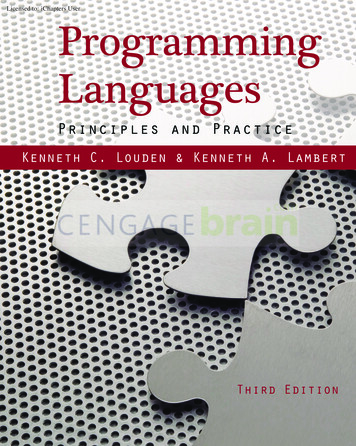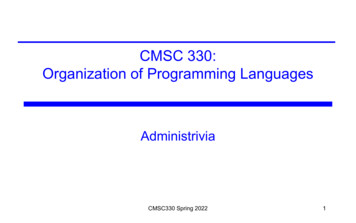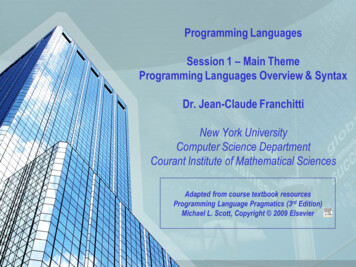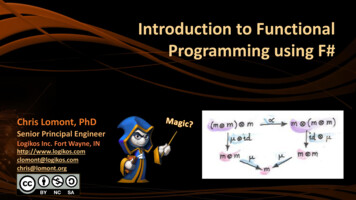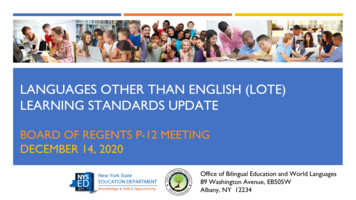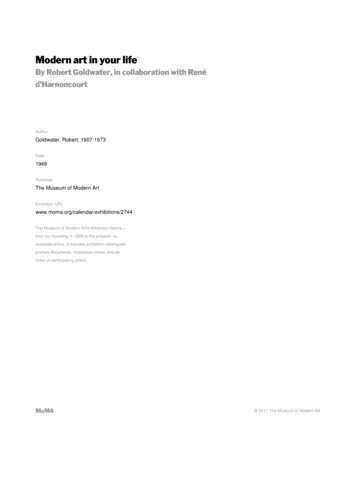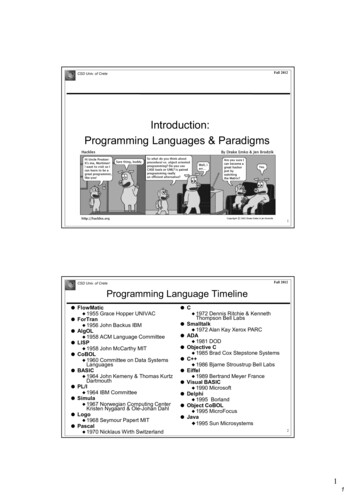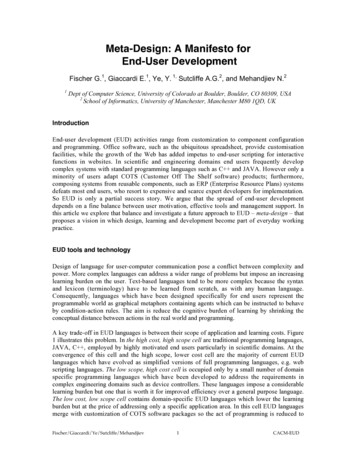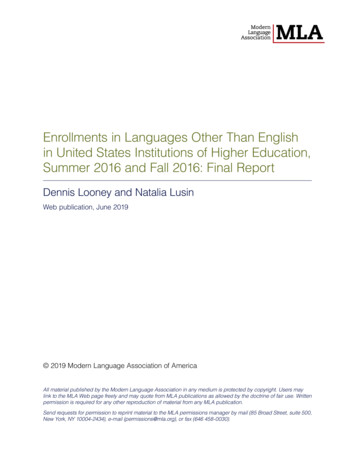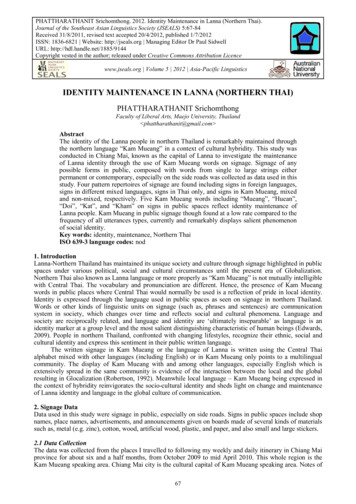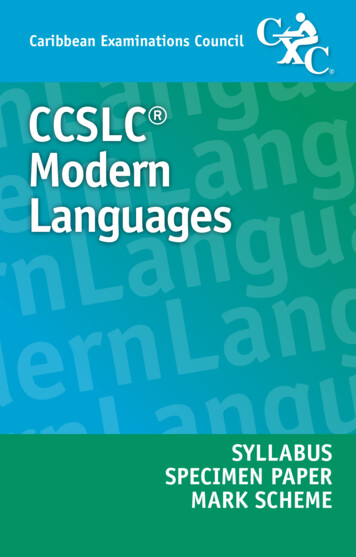
Transcription
augnaLModernCCSLCnLanguagesgModernnaLnrLanguagese nguaaLrn Langnrde anguLnerCaribbean Examinations Council SYLLABUSSPECIMEN PAPERSCHEMECSEC SYLLABUS,MARKSPECIMENPAPER,MARK SCHEME AND SUBJECT REPORTS
CARIBBEAN EXAMINATIONS COUNCILCARIBBEAN CERTIFICATE OF SECONDARY LEVEL COMPETENCE CCSLC MODERN LANGUAGESSYLLABUSEffective for examinations from May–June 2015CXC CCSLC/ML/04/13
Published by the Caribbean Examinations Council.All rights reserved. No part of this publication may be reproduced, stored in a retrieval system, or transmitted in any form, or by any means electronic,photocopying, recording or otherwise without prior permission of the author or publisher.ISBN 978-0-230-48751-2 AERCorrespondence related to the syllabus should be addressed to:The Pro-RegistrarCaribbean Examinations CouncilCaenwood Centre37 Arnold Road, Kingston 5, JamaicaTelephone Number: 1 (876) 630-5200Facsimile Number: 1 (876) 967-4972E-mail Address: cxcwzo@cxc.orgWebsite: www.cxc.orgCopyright 2013 by Caribbean Examinations CouncilThe Garrison, St Michael BB14038, BarbadosCXC CCSLC/ML/04/13
This document CXC CCSLC/ML/04/13 replaces CXC CCSLC/ML/04/2006 issued in 2006.Please note that the syllabus has been revised and amendments are indicated by italics.First issued 2006Amended 2012Revised 2013Please check the website www.cxc.org for updates on CXC’s syllabuses.CXC CCSLC/ML/04/13
ContentsINTRODUCTION . iRATIONALE . 1AIMS . 1GENERAL OBJECTIVES . 2COMPETENCIES TO BE ASSESSED . 2ORGANISATION OF THE SYLLABUS . 3RECOMMENDED APPROACHES TO TEACHING THE SYLLABUS . 3ASSESSMENT GUIDELINES . 4ELIGIBILITY FOR CCSLC . 6FORMAT OF THE ASSESSMENT . 8REGULATIONS FOR RESIT CANDIDATES . 9MODULE 1 – KNOWING ME, KNOWING YOU – Self, Family, Friends, Neighbours, Pets and The Community . 10MODULE 2 – SEE ME ON THE GO – School and Daily Routine . 20MODULE 3 – LET’S LIVE IT UP! – Sports and Leisure and Eating Out . 32MODULE 4 – CASH IT OR CHARGE IT – Shopping . 41MODULE 5 – WATCH ME GROW – Professions and Occupations, Future Plans and Travel . 53APPENDIX I – LEARNING GRID. 64CXC CCSLC/ML/04/13
Caribbean Certificate of Secondary Level CompetenceINTRODUCTIONThe Caribbean Examinations Council (CXC) in consultation with policy makers and educators in CXC Participating Territories identified the need for a new programme that would respond tothe changing demands of the education sector. A major development has been the move by all territories to universal secondary education which enables persons with a wide range ofabilities to benefit from educational provision at this level. The decision to implement programmes to achieve universal secondary education is based on an understanding that the regionneeds a well-educated and trained labour force for an increasingly competitive global environment. A sound secondary education foundation is imperative for further education and trainingand for entry in the world of work.Several territories, having recognised the need for a programme that would meet the new needs in secondary education, had embarked on the development of national programmes.However, through consultations at the regional level, policy makers and educators recognised that a regional intervention by CXC would have several benefits including cost-effectiveness,common standards, portability of certification and regional and international recognition.CXC has responded. Through the consultative processes employed in syllabus development, CCSLC was developed and first examined in 2007. The programme which is competency-basedcomprises a core of subjects – English, Integrated Science, Mathematics, Modern Languages and Social Studies. Through this core, the learner should acquire the knowledge, skills,competencies, values and attitudes that are desired in a secondary school leaver. The core developed by CXC subject panels will be examined by CXC. In addition, learners can gain additionalbenefit through special programmes that may be added as electives to the core at national level.Policy makers and educators have noted that, ideally, this core programme could be taken by all students at the stage when they are ready. However, the decision on who should take theexamination and in what year it will be taken will be made at national level in consultation with CXC. A person who successfully completes this core should have the foundation for furthereducation and training and for entry level employment. In developing and implementing this programme at the secondary level, CXC, working with its partners, took into consideration thecultural context and the aspirations of regional governments for a well-educated and trained labour force to meet the targets set for social and economic development as enshrined in theCARICOM document “The Ideal Caribbean Person (2000)”. The foundation that this programme will provide is an imperative as a base for the development of citizens as the most valuableresource of the small states of the region.The main focus of this programme is derived from the aspirations of regional governments and the Caribbean Community (CARICOM) which acknowledge that education is the route tohealthy democracies and sustainable development. The curriculum is therefore competency based and encompasses the knowledge, skills, attitudes, values and attributes expected of highschool graduates by regional Governments. Some of these knowledge, skills, attitudes, values and attributes or competencies are generic and cut across all five subjects, whilst others arepeculiar to each of the five subjects of the curriculum. The generic and subject specific competencies targeted for development in the curriculum are given below.CXC CCSLC/ML/04/13i
GENERIC COMPETENCIESSUBJECT-SPECIFIC COMPETENCIES PROBLEM SOLVING ABILITY TO COMMUNICATE ORALLY AND IN WRITING CRITICAL THINKING ABILITY TO FUNCTION IN A FOREIGN LANGUAGE INFORMED DECISION MAKING MATHEMATICAL LITERACY MANAGEMENT OF EMOTIONS SCIENTIFIC LITERACY POSITIVE SELF CONCEPT SOCIAL AND CITIZENSHIP SKILLS WORKING IN GROUPS HANDLING CONFLICT DEALING WITH DIVERSITY AND CHANGE INDEPENDENT LEARNING STRATEGIES COMPUTER LITERACY TECHNOLOGICAL LITERACYCOMPETENCIESThe structure of the programme takes into consideration that the attainment of the competencies identified is the result of processes that require life-long learning and that mastery isattained by progressive steps over differing periods of time. Bearing in mind that one of the main purposes of the curriculum is to prepare individuals to participate fully as productivemembers of society, key competencies have been identified that are essential for daily living with emphasis on the workplace. A Learning Grid (Appendix I) lists the key competencies acrossthe five subjects of the curriculum, identifies a reference number and indicates the subjects or group of subjects that specifically engage the learner in its development.CXC CCSLC/ML/04/13ii
OUTCOMES OF THE CURRICULUMThe curriculum hinges on the realisation that teaching and learning are essential instruments for the development of autonomous individuals who will be able to function effectively asproductive members of society. In this regard, the curriculum has identified knowledge, skills, attitudes, values and attributes or competencies that students who master the programmeshould have attained. These include: a positive image of self, family, community, region and world; respect for others irrespective of age, class, creed, gender, ethnicity, physical disabilities or nationality; an abhorrence of violence in all its forms and commitment to settle disputes through arbitration and conciliation; the capacity to understand that individual freedom is consonant with the acceptance of personal responsibility for one’s own actions; commitment to ethical and moral societies that recognise equality of opportunity, freedom of expression and association, and the right to fair judicial process.Main Elements of the Curriculum It provides the foundation knowledge, skills and attitudes required for secondary education. It provides the foundation for further education and training and for entry level employment. It provides articulation between and within subject groups offered in the Caribbean Secondary Education Certificate (CSEC) examination by catering for students whocontinue at secondary school to take General Proficiency examinations in academic or technical and vocational subjects. It facilitates articulation within the wider school curriculum and responds to the developmental needs of the region.CXC CCSLC/ML/04/13iii
Modern Languages Syllabus RATIONALE AIMSThe Caribbean Region is an exciting synergy of diversified cultures, as reflected in itslanguages, art forms and cuisines. English, Spanish, French and Dutch are the officiallanguages of the region and are widely used around the world.Today, Caribbean people often interact with each other and are consequently faced with thedemand to function in a range of language situations. Therefore, second language learningcan facilitate greater efficiency in interacting with others in the area of commerce, culture,education, sports and technology. The ability to understand and use a foreign languagecontributes to the development of an individual’s self-esteem and can enhance one’senjoyment during intra- and extra- regional travel.On a personal level, learning a second language promotes respect, tolerance andappreciation for cultural and linguistic diversity, fostering greater harmony, regionally andglobally. This syllabus will contribute to the development of the Ideal Caribbean Person asarticulated by the CARICOM Heads of Government. Through the exploration of beliefs, valuesand behaviours, students develop respect for human life, cultural heritage and theenvironment thus enabling them to view the target culture from a perspective of informedunderstanding. It also maximises opportunities in the field of education, training andemployment.The Council has developed this programme to provide students of the Caribbean withlanguage skills to communicate effectively with French and Spanish speakers within theregion. Additionally, the Council is of the view that the programme will encourage studentsto improve their language skills for participation in the increasingly complex globalenvironment. Students develop multiple literacies and independent and critical thinking inthe context of foreign language learning and in keeping with the UNESCO Pillars of Learning.CXC CCSLC/ML/04/131The study of Modern Languages is intended to assist students to:1.develop fundamental language skills to communicate effectively in French andSpanish in everyday situations;2.develop the ability to read, write and respond to information based on their socialenvironment in an acceptable manner;3.develop appreciation for the language and culture of French and Spanishspeaking people of the region;4.develop the foundation for further study of a foreign language;5.increase the potential for career opportunities;6.encourage a positive attitude toward people of different cultures.
GENERAL OBJECTIVES On completion of this syllabus, students should be able to:1.understand and respond appropriately to spoken forms of the language inan acceptable manner;2.communicate orally and in writing in French and Spanish to everydaysituations;3.understand material written in French and Spanish on topics relevant totheir lives and experiences;4.develop an appreciation for language and culture in their personal lives andthe lives of native Spanish and French speakers of the region;5.acquire an adequate foundation upon which they could continue tostrengthen their communicative skills in French and Spanish for furtherstudy and the world of work.CXC CCSLC/ML/04/132COMPETENCIES TO BE ASSESSEDThe Aims and General Objectives can be attained by developing the relatedkey competencies in the student. These are categorised under four ng;Writing.KEY COMPETENCIESStudents will be able to:1.converse meaningfully on a variety of topics with native speakersof Spanish and French;2.read, understand and respond appropriately to written material,such as, short statements, notices, signs and e-mails related totheir lives and experiences;3.write brief messages, simple dialogues, notes, e-mails, letters andcards relevant to their lives and experiences;4.collect, process and present information on a variety of topicsdelivered in Spanish and French;5.show an appreciation of traditions, values and norms of their ownculture and those of the people in French and Spanish speakingcountries of the Caribbean and Latin America.
ORGANISATION OF THE SYLLABUSThe syllabus is arranged in five Modules, namely:Module 1-Knowing Me, Knowing You - Self, Family, Friends, Neighbours, Pets, Home and the CommunityModule 2-See Me On The Go - School And Daily RoutineModule 3-Let’s Live It Up - Sports and Leisure and Eating OutModule 4-Cash It Or Charge It - ShoppingModule 5-Watch Me Grow - Professions and Occupations, Future Plans and TravelEmphasis will be placed on providing opportunities for students to communicate through practical, authentic and functional activities appropriate and relevant to their experiences. All fiveModules will be taught in the context of the four language skills in a cultural setting. Emphasis will be placed on students’ ability to communicate in the target language. RECOMMENDED APPROACHES TO TEACHING THE SYLLABUSThe underlying philosophy of this syllabus is that the acquisition and mastery of language is a continuous process which demands that skills be practiced and reinforced regularly. The syllabusaims at creating learners who will be able to function effectively within the contexts specified by the syllabus.In order to create an environment conducive to the achievement of proficiency in the target language(s), students must be given ample opportunities to attempt tasks. This, therefore,necessitates a paradigm shift from the traditional approach of acquisition of proficiency mainly through grammatical and lexical contexts towards the achievement of communicativecompetence which enables the learner to use the language to ensure communication. Errors will be made in the process but these should be viewed as part of the normal acquisition oflanguage, hence excessive criticism and correction must be avoided in an effort to encourage production of the language. Although it is recognised that overt instruction helps students toacquire language more efficiently, in the context of the syllabus, students are taught the grammar they need to know to accomplish defined tasks. Students should only be exposed to use ofthe Preterite Tense or the Passé Composé where it occurs naturally.The four language skills are incorporated in the syllabus because all are viewed as necessary components in enabling students to function in the language within the contexts specified by thesyllabus.This syllabus has certain implications for the classroom. Both the teacher and the learner are given an optimal environment in which to work. The teacher’s role may vary from leader/directorto that of monitor or even peer. The learners will be expected to participate more actively in the learning process. For the successful implementation of the syllabus, teachers should encourageparticipation in the communicative activities suggested. They must not, however, view these activities as prescriptive nor exhaustive.CXC CCSLC/ML/04/133
The formative assessments are necessary components of improving student achievement and serve as a source of constant feedback to the teacher to determine student readiness for theschool-based assessments. School-Based assessments must follow the guidelines specified in the generic task at the end of each Module. Although, teachers may adapt the tasks, thedelimitations of the syllabus must be respected in terms of nature of task, rubric and mark scheme.Learners should be exposed to a variety of cultural elements. This exposure should be geared mainly towards the development of cultural awareness.The syllabus serves as a foundation for further study. It should not be viewed merely as a prerequisite to the CSEC syllabus, rather students will be taught skills which would facilitate access tothe CSEC syllabus should they choose to continue their language studies. In addition, the syllabus provides entry to the world of work within the contexts specified by the syllabus. ASSESSMENT GUIDELINESAssessment is an integral component of the syllabus. Its major functions include facilitating learning, providing information which may be used by students and teachers in the planning ofsubsequent instructional experiences, and providing information on the highest level of proficiency demonstrated by the student. Teachers are encouraged to take advantage of the flexiblestructure of the syllabus to ensure that students demonstrate mastery of each stage of the syllabus before going on to the next. A student who has attained mastery should, on anysubsequent occasion and without assistance, be able to demonstrate the highest levels of proficiency on the same or an equivalent task.The assessment for this syllabus comprises two major components: School-Based Assessment (SBA) and External Assessment (EA).SCHOOL-BASED ASSESSMENT (SBA)This assessment spans two phases.Phase 1:- Formative AssessmentTeachers assess students to identify their areas of strength and weakness. This assessment may be formal or informal and is usually continuous and integrated with teaching and learning.Some teaching and learning activities are suggested in this programme of study and the assessment tasks may either be designed or sourced by the teacher, or may be selected or adaptedfrom the examples provided in the assessment column of this syllabus.Information derived from this type of assessment should be used by teachers and students in planning subsequent action. Students should be encouraged to assess themselves (self- andpeer- assessment) and, wherever practical, to participate in the planning of subsequent activity. The effectiveness and management of this approach may be enhanced by sharing theassessment criteria with students before the assessment is done, or by engaging them in the development of these criteria.Phase 2:- School-Based AssessmentTeachers assess students in order to create an objective record of the highest level of proficiency demonstrated. Students may be assessed any time after the teacher deems that they haveattained mastery. Teachers may also provide practice exercises which integrate skills across the Modules. The students may be assessed individually or in groups, and the arrangements andscheduling may be influenced by the nature of the task, and logistical and administrative considerations. A single standardised school-based task is required for each Module. Each subjecthas five modules, and for each student, the teacher will submit to CXC the scores for each of the five modules.CXC CCSLC/ML/04/134
The following three specifications facilitate the standardisation of the school-based assessment:(a)A generic task is outlined at the end of each Module. This task provides general specifications, and conditions which must be satisfied by the assessment undertaken by allstudents. However, within the limits specified, teachers may adapt the tasks to reflect local or individual interests. For each assignment, one example of an adaptation isgiven.(b)A standardised rubric or mark scheme is defined and is to be used by the teacher in scoring all students’ work. This rubric or mark scheme is designed to clearly indicatethe dimensions of interest and the relative importance of each; consequently, it may be used by teachers to verify the appropriateness of their adapted task. While thegeneric task may be adapted, teachers must not modify the mark scheme. The same mark scheme is to be used by all teachers and students across all centres andterritories.(c)It is expected that quality control and monitoring of teachers’ adherence to the specifications will be arranged and managed at local level.In order to ensure that students have reasonable opportunity to achieve and demonstrate mastery, teachers can afford their students multiple opportunities to retake or resubmit the schoolbased assessment for any Module. Feedback and suggestions for improvement may be provided between attempts, however, the process should be transparent and objective, and the markawarded should be indicative of the level of proficiency that the candidate would be able to demonstrate independently. The achievement of mastery is emphasised in this course; thus, astudent will be expected to achieve a minimum of 50% of the marks available for the school-based assessment component that will be completed in preparation for taking the externalexamination.MODULE SCHOOL-BASED ASSESSMENT TASKSMODULE 1:MODULE 2:MODULE 3:MODULE 4:MODULE 5:Identification FormReading Comprehension and Written Responses to situationsConversation and Role PlayReading and Dramatisation of Dialogues and Composition of e-mailsConversationMODERATION OF SCHOOL-BASED ASSESSMENTTeachers will be required to submit when requested by CXC, a sample of the candidates’ work completed for school-based Assessment for moderation purposes. This procedure serves toensure that the scores awarded by teachers throughout the system are consistent with the standards set by CXC. The samples will be reassessed by a CXC examiner. The examiner’s commentswill be sent to teachers as Moderation feedback.EXTERNAL ASSESSMENTAt any given sitting, candidates may register to write the external examination in one or more subjects. The external assessment will be a multiple-choice examination comprising 50 items.CXC CCSLC/ML/04/135
ELIGIBILITY FOR CCSLCA candidate will be awarded the CCSLC certificate if he/she over a period of up to five years successfully completes a minimum of five subjects selected as follows:1.Two compulsory subjectsSyllabus developed by CXC specifically for this programme(a)(b)2.EnglishMathematicsThree subjects from any group or combination of groups listed below:(a)Other subjects developed by CXC specifically for CCSLC(i)(ii)(iii)(b)Integrated ScienceModern Languages: French or SpanishSocial StudiesCSEC, TVET and Business Studies Programme – Grades I, II, III and IVHome Economics: ManagementPrinciples of BusinessClothing and TextilesPrinciples of AccountsFood and NutritionElectronic Document Preparation and ManagementBuilding TechnologyElectrical and Electronic TechnologyMechanical Engineering TechnologyOffice AdministrationAgricultural ScienceInformation TechnologyTechnical DrawingEconomicsCXC CCSLC/ML/04/136
(c)(d)CSEC Creative and Expressive Arts – Grades I, II, III and IVMusicTheatre ArtsVisual ArtsPhysical Education and SportTVET and other Programmes certified by other BoardsFor example, City and Guilds, Heart Trust/NTA (Jamaica) and Royal College of Music(e)TVET Level 1 Programmes available in the RegionFor example, Beauty Culture, Auto Mechanics, Cabinet Making and Hospitality(f)Any locally certified enrichment programme which satisfies the criteria set by CXCFor example, Citizenship Education and Community Service3.Reporting CCSLC ResultsScores from the School-Based Assessment (SBA) and the External Assessment (EA) will be combined to give a composite score with a maximum of 100. A single subject grade will bereported. The grade boundaries are as follows:Composite ScoreGrade75 - 100Master50 - 74Competent1 - 49Developing CompetenceCXC CCSLC/ML/04/137
4.5.Certification(a)A result slip will be issued after every sitting of subjects developed by CXC.(b)A Certificate will be awarded after a candidate achieves a minimum of Competent in five subjects within a five-year period.Grading SchemeCandidates, who satisfy the requirements as outlined for the CCSLC, will be awarded a certificate that is jointly conferred by CXC and the local Ministry of Education. FORMAT OF THE ASSESSMENTSchool-Based AssessmentFive Module-Assessments – one per Module.External Assessment(1 hour 15 minutes)Fifty multiple-choice items; each item will have four options.NOTES ON THE EXAMINATION1.CXC will set and mark the external assessment.2.The teacher will set and mark the assignments that make up the School-Based Assessment of each Module using the Guidelines provided at the end of each Module.3.The teacher will record the marks for each Module.4.The teacher will submit the marks for each Module.5.The teacher will also submit the total mark to CXC no later than May 31.6.CXC will combine the marks earned on the school-based assessment and the external assessment to produce the candidate’s overall grade.7.Four skills will be assessed across the School-Based Assessment and External gWriting-20%35%30%15%The four skills are assessed in the School-Based Assessment.CXC CCSLC/ML/04/138
Two skills are assessed in the External Assessment: Listening and Reading.8.The mark allocation for this subject is shown below:ComponentTotal Marks%Contribution to CompositeScoreModule 1Module 2School-Based Assessment102020203010050External Assessment101010101050501520202025% Contribution toComposite score9.Marks AllocatedModule 3Module 4Module 5100******A result slip will be provided after every sitting for which a candidate registers for the external examination in one or more subjects. The candidate has up to five years from the yearof the first registration to complete the five subjects in order to be awarded a CCSLC certificate. REGULATIONS FOR RESIT CANDIDATES1.Resit candidates must complete Papers 01 and 02 of the examination for the year for which they re-register. Resit candidates who have earned 50 per cent of the MODERATED score forthe School-Based Assessment may elect not to repeat this component, provided they re-write the examination no later than the year following their first attempt. The scores for theSchool-Based Assessment can be transferred once only, that is, to the examination immediately following that for which they were obtained.2.Resit
cont ibutes to the development of an individual [s self-esteem and can enhance one [s . enjoyment during intra- and extra- regional travel. On a personal level, learning a second language promotes respect, tolerance and . the context of foreign language learning and in keeping with the UNESCO Pillars of Learning. The study of Modern Languages .
